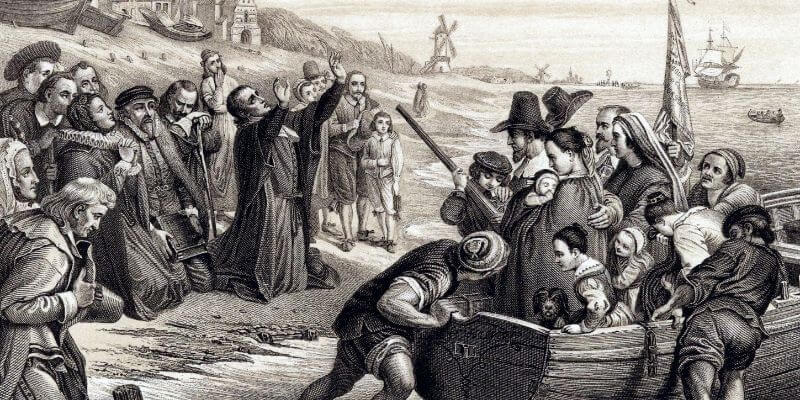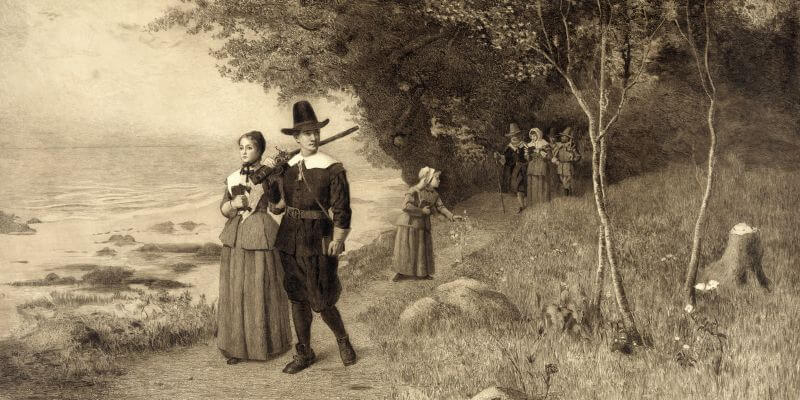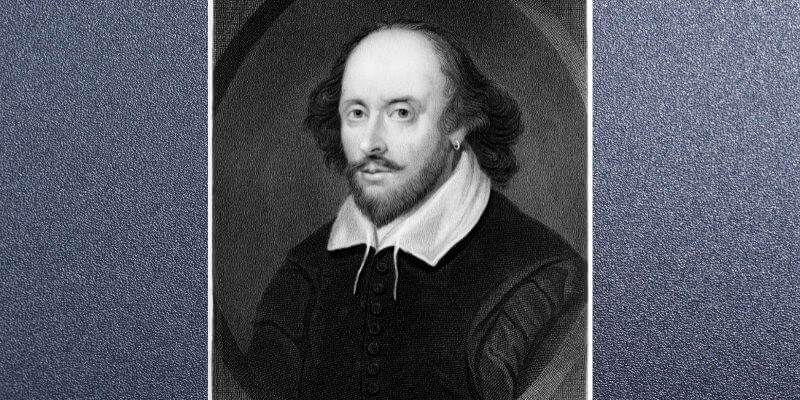A Record Of Survival And Thanksgiving

The Pilgrims barely survived the harsh winter after arriving in the new land, now known as North America. Most perished from illness and starvation. Yet, they praised God and expressed uncommon thankfulness. For what were they thankful?
We gain insight into their reasons for thankfulness from the letters of colony Governors Edward Winslow and William Bradford. George Morton, a Mayflower Pilgrim, in December 1621, published letters written to him from Winslow in a book called, “A Relation or Journal of the Beginning and Proceedings of the English Plantation Settled at Plymouth in New England, 1622.” Morton stayed in England the first year to handle business affairs for the Pilgrims.
Winslow Describes The New World – Hope

Consider excerpts from Governor Winslow’s letter to Morton,
…In the short time we few have been here, we have built seven dwelling houses, four buildings for the use of the plantation, and have made preparation for several others. We sowed last spring some twenty acres of Indian corn and some six acres of barley and peas. According to the manner of the Indians, we fertilized our ground with herrings, or rather shads, which we have in great abundance and catch with great ease near our homes. Our corn did prove well, and God be praised, we had a good increase of Indian corn and our barley was fairly good, but our peas were not worth gathering. We feared that they were sown too late. They came up very well, and blossomed, but the sun parched them in the blossom.
Our harvest being collected our governor sent four men fowling together so we might rejoice together in a more special way after we had gathered the fruit of our labors. In just one day the hunters killed as much fowl as if their hunting party had been larger. The fowl fed the company almost a week at which time, among other recreations, we drilled with our fire arms. Many of the Indians joined us including Massasoit, the greatest king, and some ninety of his men. We all entertained and feasted together for three days. The Indians went out and killed five deer which they brought to the plantation and bestowed on our governor, the captain, and others. And although it is not always as plentiful as it was at that time, yet by the goodness of God we are so far from want that we often wish you could partake of our plenty.
We have found the Indians very faithful in their covenant of peace with us and very loving and ready to please us. We often visit them, and they come to us. Some of us have explored fifty miles into the land with them. The occasions and relations of them you shall understand by our general and more full declaration of such things as are worth noting [in A Relation]. Yea, it has pleased God to instill in the Indians a fear of us and love unto us so that not only their greatest king, Massasoit, but also all the princes and peoples round about us have visited us.…There is now great peace among the Indians themselves which was not the case formerly, neither would have been but for us, and we for our part walk as peaceably and safely in the wood as on the highways in England. We entertain the Indians familiarly in our houses and they are friendly to us bestowing their venison as gifts. They are a people without any religion or knowledge of any God, yet they are very trustworthy, quick of apprehension, and ripe witted.
I never in my life remember a more seasonable year than we have here enjoyed [he must be excluding the previous winter], and if we had cows, horses, and sheep, I make no question but that men might live as contented here as in any part of the world. For fish and fowl, we have great abundance, fresh cod in the summer is but mean meat for us, our bay is full of lobster all summer and affords a variety of other fish. In September we can catch a hogshead [a barrel holding just over 60 gallons] of eels in a night with little trouble digging them out of their beds. All winter we have mussels and clams available, and we have no oysters near by, but we can have them brought by the Indians when we want. All the spring time the earth brings forth very good salad herbs, and there are grapes, white and red, which are very sweet and strong also. There are also strawberries, gooseberries, raspberries, etc., and plums of three sorts, white, black, and red, which are almost as good as a damsen [a variety of plum]…. The Indians that dwell thereabout were the owners of the corn we found in caves, for which we have given them full payment and we are in a great league with them.”
Speaking out of concern about an enemy ship that may have anchored offshore, Winslow wrote, “God’s purpose for us was better than we supposed because the ship was the Fortune. All its passengers came to us healthy with none being sick from the journey (otherwise than by sea sickness) and so they continue healthy at this time by the blessing of God. The good-wife Ford bore a son the first night she landed and both of them are very well.
When it pleases God, we are settled and fitted for the fishing business and other trading. I doubt not but that by the blessing of God the gain will give satisfaction to all.”
Winlow’s letter shows optimism and thankfulness for the new land and the colony. There was an abundance of food and peace with Indians.
Bradford Describes The Old World – Suffering

Governor William Bradford also wrote of the history of the colony in a two-volume work titled, “Of Plymouth Plantation.” An excerpt from chapter one of his books, describes the persecutions suffered by Christians in England. Though the conditions were harsh in the new land, they were better conditions for the Pilgrims than from what they came.
The following is copied from Bradford’s original writings. The word “ye” is “the” for today’s readers. In Bradford’s day, there was a lack of spelling convention, but the words can be understood phonetically. He wrote,
It is well knowne unto ye godly and judicious, how ever since ye first breaking out of ye lighte of ye gospell in our Honourable Nation of England, (which was ye first of nations whom ye Lord adorned ther with, affter yt grosse darknes of popery which had covered & overspred ye Christian worled,) what warrs & opposissions ever since, Satan hath raised, maintained, and continued against the Saincts, from time to time, in one sorte or other. Some times by bloody death and cruell torments; other whiles imprisonments, banishments, & other hard usages; as being loath his kingdom should goe downe, the trueth prevaile, and ye churches of God reverte to their anciente puritie, and recover their primative order, libertie, & bewtie. But when he could not prevaile by these means, against the maine trueths of ye gospell, but that they began to take rootting in many places, being watered with ye blooud of ye martires, and blessed from heaven with a gracious encrease; He then begane to take him to his anciente strategemes, used of old against the first Christians. That when by ye bloody & barbarous persecutions of ye Heathen Emperours, he could not stoppe & subuerte the course of ye gospell, but that it speedily overspred with a wounderfull celeritie the then best known parts of ye world, He then begane to sow errours, heresies, and wounderfull dissentions amongst ye professours them selves, (working upon their pride & ambition, with other corrupte passions incidente to all mortall men, yea to ye saints them selves in some measure,) by which wofull effects followed; as not only bitter contentions, & hartburnings, schismes, with other horrible confusions, but Satan tooke occasion & advantage therby to foyst in a number of vile ceremoneys, with many unproffitable cannons & decrees, which have since been as snares to many poore & peaceable souls even to this day. So as in ye anciente times, the persecutions by ye heathen & their Emperours, was not greater then of the Christians one against other; the Arians & other their complices against ye orthodoxe & true Christians. As witneseth Socrates in his 2. booke. His words are these; The violence truly (saith he) was no less than that of ould practised towards ye Christians when they were compelled & drawne to sacrifice to idoles; for many indured sundrie kinds of tormente, often rackings, & dismembering of their joynts; confiscating of ther goods; some bereaved of their native soyle; others departed this life under ye hands of ye tormentor; and some died in banishmēte, & never saw ther cuntrie againe.”
Thankful For Better Conditions

From these excerpts of Winslow and Bradford, the Pilgrims were blessed with abundance and hope of a new life in the new world. The harsh living conditions and loss of lives in the new world were less severe than from what they had come. Life was better for them in the new colony, and for that they were thankful.
God’s blessings were abundant. Life was better, and the Pilgrims were grateful for the new start. It is difficult for us to appreciate the thankfulness of the Pilgrims under such harsh conditions, but for them, their circumstances for living in the new world was an improvement.
Learning To Be Thankful

Living in a world of sin and Satan, it is expected that persecution, suffering, and death will prevail. God warned humanity not to choose sin. The consequences are horrible. By the grace of God, we survive and have opportunities to repent.
The lesson to learn from the Pilgrims is to be thankful to God for hope of a better future. He promises a better world where there is no sin. Satan will be banished. Righteousness, peace, justice, and love will prevail.
The alternative is to reject God’s way and prefer life in a world of sin and suffering. This is a world of ungratefulness. Romans 1:21 says of our current world,
Because that, when they knew God, they glorified him not as God, neither were thankful; but became vain in their imaginations, and their foolish heart was darkened.
To not be thankful to God leads to greater suffering and sorrows. He is the solution to our sufferings and hopelessness.
Why God Does Not Prevent Suffering Now

You may wonder why He does not deliver us from this world of sorrows. The answer is simple. He is giving us an opportunity to learn from our mistakes and to recognize we need to change our minds about how to live. We need to thank God for His mercy and grace to allow us to survive in this world.
This world of sorrows is a world of our choosing. This is not the way He wants it. The suffering in the world is due to sin. We choose sin, not God. We are to blame for the miseries in this world.
God could prevent our sufferings, but then we would not learn from our mistakes. Humanity at-large does not learn from their mistakes regardless of their sufferings. They fail to see the connection between sin and the subsequent suffering. Instead, they blame God for their miseries.
The truth is, God is waiting for us to change our minds. He is letting us live in the world of our own making to learn from our mistakes. Some repent. Most do not. God instructs. We choose. The world of sorrows we live in is the result of our own choices.
God Promises A Better Future

But for those who choose to repent and to admit God’s way is better, they will enjoy a better future. God promises a world without sin and Satan.
Those who do not want God’s way will get the world they want. But where there is sin, there will be torment and suffering. The proof of this is the world we live in. Wisdom and common sense will lead to a different choice. Those who choose God’s way will thank Him for His love and promise to deliver them from a world of sin.
How To Be Thankful

Are you thankful for the hope of God’s promise? The Pilgrims were. They looked forward to the fulfillment of God’s promise of life everlasting in a perfect world free of sin and suffering. What are you thankful for?
Do you want to be happy and thankful? You will discover God’s way is the only way to be happy and thankful. Believe in Him and accept His way, and you will be happy and thankful for the hope of His promise for life and peace forever.
References
- bgwaugh. November 21, 2017 . The First Thanksgiving, Edward Winslow, 1621. Presbyterians Of The Past. [https://www.presbyteriansofthepast.com/author/bgwaugh] Accessed 11-23-22.
- Kurtz, Jenifer. August 16, 2019. American Literature I: An Anthology of Texts From Early America Through the Civil War. Editors Jenifer Kurtz and Dale Dulaney. [https://viva.pressbooks.pub/amlit1/chapter/of-plymouth-plantation-william-bradford] Accessed 11-23-22.

1 thought on “Thankful For God’s Promise”
Thanks!